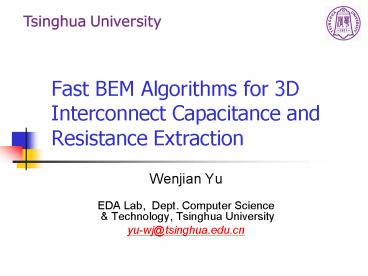Fast BEM Algorithms for 3D Interconnect Capacitance and Resistance Extraction
1 / 8
Title:
Fast BEM Algorithms for 3D Interconnect Capacitance and Resistance Extraction
Description:
Fast BEM Algorithms for 3D Interconnect Capacitance and Resistance Extraction. Wenjian Yu. EDA Lab, Dept. Computer Science & Technology, Tsinghua University ... –
Number of Views:69
Avg rating:3.0/5.0
Title: Fast BEM Algorithms for 3D Interconnect Capacitance and Resistance Extraction
1
Fast BEM Algorithms for 3D Interconnect
Capacitance and Resistance Extraction
- Wenjian Yu
- EDA Lab, Dept. Computer Science Technology,
Tsinghua University - yu-wj_at_tsinghua.edu.cn
2
Direct BEM to solve Laplace Equ.
- Physical equations
- Laplace equation within each subregion
- Same boundary assumption as Raphael RC3
- Bias voltages set on conductors
A cross-section view
(u is potential)
(q is normal electric field intensity)
- Direct boundary element method
- Greens Identity
- Freespace Greens function as weighting function
- Laplace equation is transformed into BIE
s is a collocation point
3
Discretization and integral calculation
A portion of dielectric interface
- Discretize domain boundary
- Partition quadrilateral elements with constant
interpolation - Non-uniform element partition
- Integrals (of kernel 1/r and 1/r3) in discretized
BIE
- Singular integration
- Non-singular integration
- Dynamic Gauss point selection
- Semi-analytical approach improvescomputational
speed and accuracy for near singular integration
4
Locality property of direct BEM
- Write the discretized BIEs as
, (i1, , M)
- Non-symmetric large-scale matrix A
- Use GMRES to solve the equation
- Charge on conductor is the sum of q
For problem involving multiple regions, matrix A
exhibits sparsity!
5
Quasi-multiple medium method
- Quasi-multiple medium (QMM) method
- Cutting the original dielectric into mxn
fictitious subregions, to enlarge the matrix
sparsity in BEM computation - With iterative equation solver,sparsity brings
actual benefit
A 3-D multi-dielectric case within finite
domain, applied 3?2 QMM cutting
- Strategy of QMM-cutting
- Uniform spacing
- Empirical formula to determine (m, n)
- Optimal selection of (m, n)
6
Efficient equation organization
- Too many subregions produce complexity of
equation organizing and storing - Bad scheme makes non-zero entries dispersed, and
worsens the efficiency of matrix-vector
multiplication in iterative solution - We order unknowns and collocation points
correspondingly suitable for multi-region
problems with arbitrary topology
- Example of matrix population
12 subregions after applying 2?2 QMM
This ensures a near linear relationship between
computing time and non-zero entries
7
Efficient GMRES preconditioning
- Construct MN preconditioner Vavasis, SIAM J.
Matrix,1992 - Neighbor set of variable i
- Solve reduced eq. , fill back to
ith row of P
- Our work for multi-region BEA, propose an
approach to get the neighbors, making solution
faster for 30 than original Jacobi preconditioner
8
A practical field solver - QBEM
- Handling of complex structures
- Bevel conductor line conformal dielectric
- Structure with floating dummy fill
- Multi-plane dielectric in copper technology
- Metal with trapezoidal cross section
- 3-D resistance extraction
- Complex 3-D structure with multiple vias
- Improved BEM coupled with analytical formula
- Extract DC resistance network
- Hundreds/thousands times fast thanRaphael, while
maximum error lt3































